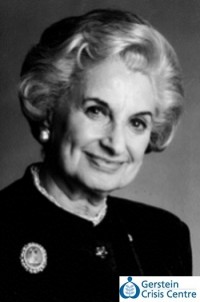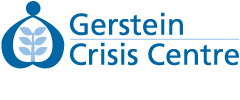Gerstein Crisis Centre was established in Toronto in 1989 to provide community-based crisis support that reflects and recognizes the needs and wishes of people experiencing a mental health crisis.
Key Milestones
- 1989 Dr. Reva Gerstein established Gerstein Crisis Centre following her report “The Mayor’s Action Task Force on Discharged Mental Patients” for the City of Toronto. Follow this link to read a PDF version of the report The Mayor’s Action Task Force on Discharged Mental Patients (PDF)
- Thanks to funding from the Ministry of Health, telephone and mobile services began
- 1990 the Charles Street site officially opened providing 24/7 service including 10 crisis beds offering 3-day crisis stays
- 1995 Gerstein Centre partnered with the Salvation Army Maxwell Meighen Centre and Evangeline Centre to establish the Primary Support Unit (PSU), providing short-term crisis support to people experiencing homelessness and mental health crises
- 1996 Gerstein Centre partnered with the Anduhyan Women’s Shelter to establish the Aboriginal Crisis Intervention Program
- 1999 the Centre partnered with the Lumenus (formerly Griffin Centre) to provide transitional housing through the Homebase Program for adults experiencing homelessness and are living with developmental disabilities and mental health issues
- This partnership has since grown to include the Griffin Community Support Network, Vita Community Living Services, Urgent Response After Hours (2019), and the George Brown College Day Program
- 2005 the Centre received funding to create Mental Health and Justice (MHJ) Short-term Crisis Beds for individuals who are dealing with a mental health issue and are currently involved in the criminal justice system
- 4 additional Mental Health and Justice Short-term Crisis Beds for men were added to the Primary Support Unit operated out of Salvation Army Maxwell Meighen Centre
- 2006 the Centre received additional funding to increase the number of MHJ beds available in downtown Toronto. Operating short term in partnership with High Park Villa and Habitat Services while work started to create a stand-alone centre
- 2007 the Centre established a second location “Gerstein on Bloor” at 1045 Bloor Street West thanks to additional funding from the Ministry of Health and Long-Term Care
- Gerstein on Bloor began housing 9 MHJ Beds and the 5 Female Crisis Beds (previously located at the Salvation Army Evangeline Residence)
- The Aboriginal Crisis Intervention Program was divested to Anishnawbe Health and the Aboriginal Crisis Management Program was established
- 2010 the Centre was asked by the Toronto Central LHIN and the Toronto Drug Strategy to create a 24-hour crisis service for Adults dealing with concurrent or serious substance use issues
- The Concurrent Crisis Management and Follow-up team was established soon after and integrated with the centre’s existing crisis services for a 24-hour response
- In partnership with the University Health Network Ossington Withdrawal Management Site and Eva’s Satellite, 7 new crisis beds were created
- 2012 Gerstein Crisis Centre created FRESH offering peer-led physical activities and social and community connection
- 2014 Gerstein Crisis Centre celebrated 25 years of service
- Gerstein Crisis Centre strengthened access to recovery based learning and education through the establishment of WRAP groups tailored for youth, Spanish speaking, and Syrian refugee communities
- 2016 the City of Toronto Office of Emergency Management reached out to establish a specialized health response for Emergency Reception Centres established during an emergency. The Gerstein Crisis Centre began providing 24-hour central access to a coordinated Toronto wide response
- 2017 a WRAP group focusing on Substance Use and Addiction is developed and offered to people in our crisis beds and follow-up services
- 2018 Gerstein Crisis Centre responds to a request from the City of Toronto and TCLHIN to increase Mobile Crisis Services to respond to increasing concerns around homelessness, mental health, and addictions in the downtown core
- The Mobile Crisis Intervention and Follow-up Team was created in partnership with St. Michael’s Hospital, TCLHIN Home and Community Care, the City of Toronto Street Outreach and harm reduction services, and the StreetHealth/Sherbourne Health Bus
- 2019 Gerstein Crisis Centre turned 30!
Reva Gerstein, C.C., O.Ont., Ph.D., LL.D.
Dr. Reva Gerstein had a long and distinguished career as a psychologist, educator, and community leader. She made an extraordinary impact on mental health and its related research. Educated as a psychologist, she received her Ph.D. from the University of Toronto in 1945.
Dr. Gerstein was Chancellor Emeritus at the University of Western Ontario and has received honourary doctorates from the University of Toronto, York University, the University of Western Ontario, Lakehead University, the University of Guelph, and Queen’s University.
She worked with Clarence Hincks in founding the Canadian Mental Health Association and later became the first Director of Program Planning for C.M.H.A. In 1987, she received the C.M. Hincks Award from the C.M.H.A.
She was an Honourary Life Fellow of the Canadian Psychological Association and a Life Member of the American Psychological Association and was a Founder and past Chair of the Canadian Institute for Advanced Research and the C.M. Hincks Child and Adolescent Centre.
She was a past member of the Board of Directors and Honourary Trustee of The Hospital For Sick Children and a past member of the Board of Governors of Mount Sinai Hospital.
In the 1980s, Dr. Gerstein chaired the Toronto Mayor’s Action Task Force on Discharged Psychiatric Patients. The report of the task force was published in 1984 and as a result of its recommendations, a number of significant community mental health services were established in Toronto. Among them was the Gerstein Crisis Centre, which was opened in 1989. Dr. Gerstein chaired its founding board and remained involved in the centre.
Dr. Gerstein’s contributions to the field of mental health have been internationally recognized. She received many honours over the years recognizing her public service including Woman of the Year – B’nai Brith (1961), Life Fellow of the Ontario Psychiatric Association, Life Fellow of the Canadian Psychological Association, Life Member of the American Psychological Association, C.M. Hincks Award from CMHA (1987), Honourary Doctorates from Western University, University of Guelph, Queen’s University, Lakehead University, York University, and the University of Toronto. She was a Member of the Order of Ontario, and a Member (1974), promoted to Officer (1979), promoted Companion of the Order of Canada (1997).

Dr. Reva Gerstein 1917-2020
In January of 2020, we were saddened to learn of the passing of our founding Chair, Dr. Reva Gerstein. Dr. Gerstein was a remarkable woman who lived her life with compassion and respect for all humanity and the inherent dignity of each individual. She spent a lifetime working to give a voice to those usually unheard by society. Her advocacy supported a community of people affected by mental health and poverty to speak up and gave rise to the establishment of community supports and services that seek to better the lives of those affected by mental health issues, including Gerstein Crisis Centre. We at Gerstein Centre will be forever grateful to Dr. Gerstein for all that she taught us and for instilling the values and vision that we work and live by.

